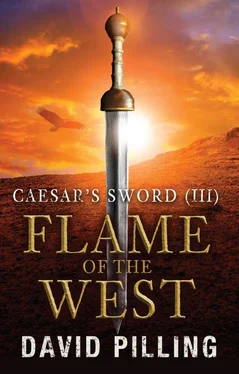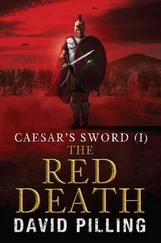David Pilling - Flame of the West
Здесь есть возможность читать онлайн «David Pilling - Flame of the West» весь текст электронной книги совершенно бесплатно (целиком полную версию без сокращений). В некоторых случаях можно слушать аудио, скачать через торрент в формате fb2 и присутствует краткое содержание. Год выпуска: 2014, Жанр: Исторические приключения, на английском языке. Описание произведения, (предисловие) а так же отзывы посетителей доступны на портале библиотеки ЛибКат.
- Название:Flame of the West
- Автор:
- Жанр:
- Год:2014
- ISBN:нет данных
- Рейтинг книги:3 / 5. Голосов: 1
-
Избранное:Добавить в избранное
- Отзывы:
-
Ваша оценка:
- 60
- 1
- 2
- 3
- 4
- 5
Flame of the West: краткое содержание, описание и аннотация
Предлагаем к чтению аннотацию, описание, краткое содержание или предисловие (зависит от того, что написал сам автор книги «Flame of the West»). Если вы не нашли необходимую информацию о книге — напишите в комментариях, мы постараемся отыскать её.
Flame of the West — читать онлайн бесплатно полную книгу (весь текст) целиком
Ниже представлен текст книги, разбитый по страницам. Система сохранения места последней прочитанной страницы, позволяет с удобством читать онлайн бесплатно книгу «Flame of the West», без необходимости каждый раз заново искать на чём Вы остановились. Поставьте закладку, и сможете в любой момент перейти на страницу, на которой закончили чтение.
Интервал:
Закладка:
Lucius returned with commendable speed, mounted and leading my horse. My men cantered behind him. They were a motley, undisciplined crew, though full of youthful zeal, and I was hard-put to restrain them from pushing ahead of the infantry.
We finally emerged from the gate as part of the rearguard, and I looked for the detachment of Hunnish cavalry on the left wing.
There was no left wing. Belisarius had decided to seize the initiative and order a general advance instead of waiting for his army to lumber into position. With every passing moment, more Goths were escaping across the bridge onto the Tuscan side of the river.
Trumpets squalled across the plain, and a massed roar burst from the leading squadrons of cavalry as they surged into a gallop.
I saw Belisarius’ banner to the fore, rippling at the head of his Veterans. As Lucius had said, the sky was on fire, the reddish pink of dawn obscured by twisting pillars of smoke and leaping tongues of orange flame. The Goths had set light to their camp – tents, stockades, wagons, towers and all, hoping that the conflagration would shield their retreat.
Belisarius cared nothing for fire. His cavalry raced in pursuit, leaping the deserted entrenchments and charging through the wall of smoke. They disappeared from view, though the sound of fighting and killing could be heard beyond.
“Charge!” I shouted, drawing Caledfwlch. Lucius sounded the order, and we galloped forward in the wake of the forward squadrons, determined to be in at the death.
The siege had been long and bloody, with no quarter given on either side. Hatred of the Goths spurred on my men, especially the natives, raised on tales of their ancestors and the lost glory of the Western Empire. Here was a chance to throw off the shameful yoke of their barbarian conquerors and reclaim their city.
We careered around a line of burning wagons, and burst through the veil of smoke into a scene of bloodshed. Thousands of Gothic auxiliaries were stampeding towards the bridge, but the foremost of our cavalry had caught them in the open.
The Goths were trying to turn, to form line of battle against our heavy lancers and horse-archers, but everywhere their discipline was failing. I saw Gothic officers, brave men, dismount and rally around their standards, resolved to die fighting rather than show their backs to the enemy.
Some managed to collect enough men to form a semblance of a shield-wall. Our horse-archers rode around them in circles, shooting the hapless Goths down from afar, swiftly eroding their ragged lines until nothing remained but a few wounded survivors and great piles of arrow-riddled corpses.
Belisarius allowed them no respite. His Veterans had ploughed into the rear of a detachment of spearmen, spearing and trampling half their number and sending the rest fleeing in bloody rout.
My men were eager to join the hunt, but I was careful to restrain them. They were light cavalry, armed with shields and spears, and would come to grief if I threw them against the Gothic shields. I had enough experience of war to know that light cavalry are best used as skirmishers on the battlefield, harrying the enemy flanks and hunting down fugitives.
I looked around, and spied a unit of Gothic javelin-men breaking away from the fighting and fleeing along the bank of the Tiber. Some followed the course of the river, others threw away their helms and shields and plunged into the water, hoping to swim across to the opposite bank.
“Ride them down!” I shouted, straining my voice to be heard above the din, “drown them in the river! Kill them!”
I steered my horse to the south, skirting the edges of the battle, followed by Lucius and my standard bearer. A good number of my command followed, though others peeled away to loot the dead and dying.
The Goths tried to run, but my men spread out to herd them down the steep slope towards the river. There, in the shallows, we butchered them at will. Some few offered desperate resistance, others begged for life, falling on their knees in the water and screaming like frightened children.
“No mercy!” I bawled, my sword-arm red to the elbow with barbarian blood, “slay them all!”
I am not a cruel man, but this was war. The Goths still held a massive advantage in numbers, and it was imperative we killed as many as possible. Even now, with half his army in full flight, Vitiges might rally the remainder and overwhelm us.
From the river, I had an unrivalled view of what happened next. Vitiges could be forgiven for thinking he had suffered enough disasters, but God was not on his side.
The King had escaped to the Tuscan side of the river, and there tried to regroup his battered host and launch a counter-attack. His best troops rallied around the royal banner, and stormed back across the Milvian Bridge to aid their comrades being cut to pieces on the other side.
At the same time the wavering Gothic infantry broke under our relentless assaults. Abandoning their standards, they flooded towards the narrow stone bridge. Our triumphant cavalry rode among them, hacking and stabbing, carpeting the ground with bodies.
Before the siege began, Belisarius had constructed a gigantic wooden tower at the eastern end of the river, to guard against the enemy attempting a crossing. The Goths had seized the tower and held it ever since, but now panic seized the garrison. They quit their posts, running down the steps outside the tower or leaping from the parapet into the fast-flowing waters of the Tiber.
Many drowned, or were shot down as they tried to swim to safety. Soon the river was full of floating corpses, gently swirling in circles as they were washed downstream.
I watched, my nostrils filled with the heady stench of blood and death, as the runaways from one side of the river collided with reinforcements from the other. The bridge was too narrow to bear them all, and hundreds of Goths were pitched howling into the Tiber.
Weighed down by their armour, many swiftly sank from view. Others tried to struggle out of their heavy mail hauberks before they were dragged under. I almost pitied the wretches as they floundered helplessly in the water. Some of our men dismounted and enjoyed great sport on the riverbank, shooting arrows and casting spears, until the Tiber was choked with human wreckage.
The Goths on the Tuscan side of the river were powerless to help their comrades. I saw the royal standard start to move away from the field, and briefly glimpsed Vitiges himself under it, a stocky, compact figure mounted on a chestnut mare. His guards closed up around him as he left the field.
“Roma Victor!”
The ancient war-cry echoed and re-echoed across the field. The Goths were beaten, and the victory of Belisarius was complete.
7.
I expected Belisarius to unleash his cavalry and send us in pursuit of the retreating Goths. Instead, ever cautious, he despatched a mere thousand horse under a captain named Hildiger, with orders to shadow the Goths and obtain reinforcements from our garrison stationed at the seaport of Ancona.
Belisarius was right to be careful. A wounded beast is dangerous. The Goths still outnumbered us, even after losing half their army at the Milvian Bridge.
Vitiges fled north, to his capital at Ravenna, and covered his retreat by leaving men to guard certain towns and fortresses. Four thousand at Auximum, two thousand at Urbino, and another three thousand scattered among smaller places.
Belisarius despatched me with Hildiger to track the Goths. Hildiger was a capable and experienced officer of mixed Germanic ancestry, and I was to act as his second-in-command.
“Another promotion,” said Procopius, who was present in the general’s pavilion, “though an unofficial one. Pro tem , as it were. Continue to do well, and you might find yourself in charge of an army.”
Читать дальшеИнтервал:
Закладка:
Похожие книги на «Flame of the West»
Представляем Вашему вниманию похожие книги на «Flame of the West» списком для выбора. Мы отобрали схожую по названию и смыслу литературу в надежде предоставить читателям больше вариантов отыскать новые, интересные, ещё непрочитанные произведения.
Обсуждение, отзывы о книге «Flame of the West» и просто собственные мнения читателей. Оставьте ваши комментарии, напишите, что Вы думаете о произведении, его смысле или главных героях. Укажите что конкретно понравилось, а что нет, и почему Вы так считаете.












